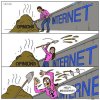Vegard Pompey
ALLY TO GOOD, NIGHTMARE TO YOU
Didn't feel like mentioning that your source is Chairman Pai himself? I guess you figured I wouldn't trust his words very far. You'd be right. The only actual statistic he cites to support his claim that this has been bad for consumers, is that broadband network investment has declined, which is naturally going to happen as coverage increases.
As for the Net Neutrality rules passed in 2015; my understanding is that it went something like this; when the internet was emerging, it was implicitly assumed that ISPs were subject to common carrier rules. Since this was before video streaming became a big thing, there weren't vast differences in bandwidth usage. It wasn't until much later (I believe this was in part in response to rumors that ISPs had already started throttling certain kinds of internet usage) that the net neutrality conversation began in earnest. The FCC released a proposal to explicitly allow fast and slow lanes and it was met with universal criticism. So instead they passed a law to protect internet services under Title II. The takeaway being this; the reason the internet worked before 2015 was because net neutrality was implicit and ISPs weren't actively trying to subvert it.
Some reading
As for the Net Neutrality rules passed in 2015; my understanding is that it went something like this; when the internet was emerging, it was implicitly assumed that ISPs were subject to common carrier rules. Since this was before video streaming became a big thing, there weren't vast differences in bandwidth usage. It wasn't until much later (I believe this was in part in response to rumors that ISPs had already started throttling certain kinds of internet usage) that the net neutrality conversation began in earnest. The FCC released a proposal to explicitly allow fast and slow lanes and it was met with universal criticism. So instead they passed a law to protect internet services under Title II. The takeaway being this; the reason the internet worked before 2015 was because net neutrality was implicit and ISPs weren't actively trying to subvert it.
Some reading














